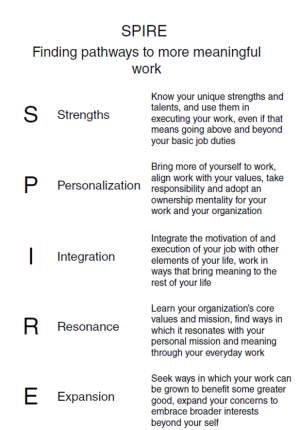 I´m a big fan of the work of Professor Michael F. Steger (Colorado State University), one of the world´s foremost scholars on the subject of meaning in life and meaning in work (see his TEDx Talk here).
I´m a big fan of the work of Professor Michael F. Steger (Colorado State University), one of the world´s foremost scholars on the subject of meaning in life and meaning in work (see his TEDx Talk here).
In fact, he´s not only a top-notch scientist, but at the same time he´s able to turn his research (plus other people´s scholarly work) into actionable insights for business leaders. Accordingly, I was more than thrilled when Michael agreed to work with me on a paper that showcases some research on the question of how leaders can help to make the work of their subordinates more meaningful. While the original paper was written in German, there´s a neat summary of that research (CAARMA leadership) available via Positive Psychology News Daily.
Today, I´d like to introduce you to another framework that has been described by Michael, precisely via this book chapter. Where CAARMA leadership focuses on the role of the leader in creating (more) meaningful work for employees, the acronym S.P.I.R.E. points us towards all those resources and pathways to meaning that employees control unmediatedly. The building blocks of this acronym have been synthesized by Steger based on some 40 years of extant research on meaningful work.
Strengths
In Steger´s words: Know your unique strengths and talents, and use them in executing your work, even if that means going above and beyond your basic job duties.
Now obviously, in order to make this recommendation work, you´ll have to find out what your strengths are in the first place. A good place to start would be taking the VIA survey, a test that was developed based on a framework of 24 character strengths first described by Christopher Peterson and Martin Seligman. Or, you could create your Reflected Best Self™ portrait, a method developed at the Center for Positive Organizations (Ross School of Business). In this LinkedIn article, I explain how you can do that.
Personalization
In Steger´s words: Bring more of yourself to work, align work with your values, take responsibility and adopt an ownership mentality for your work and your organization.
A rewarding pathway to tackling the challenge of (increased) ownership could be practicing what Professor Amy Wrzesniewski (Yale) calls job crafting – which is defined as ‘‘the physical and cognitive changes individuals make in the task or relational boundaries of their work’’. Basically, via job crafting employees progressively turn the job they currently have into the one they really want to be in. Here´s a nice description of fellow Penn MAPPster Paula Davis-Laack via Psychology Today.
Integration
In Steger´s words: Integrate the motivation of and execution of your job with other elements of your life, work in ways that bring meaning to the rest of your life.
Now, that is obviously a task which cannot be executed just like 1…2…3. Finding the right balance (or rather: blend) to me seems to be an ongoing internal exploration and negotiation between the different selves that comprise the “whole person” over the span of a lifetime. Nevertheless, I recently stumbled upon this beautiful article in the Harvard Business Review crafted by Brianna Caza, Lakshmi Ramarajan, Erin Reid, and Stephanie Creary that might point you towards some meaningful pathways: How to Make Room in Your Work Life for the Rest of Your Self.
Resonance
In Steger´s words: Learn your organization’s core values and mission, find ways in which it resonates with your personal mission and meaning through everyday work.
As with the aspect of strengths, this pathway will not come to life without a fair amount of soul-searching and self-discovery. Aligning our personal mission with that of our organization requires discovering (or rather: building and exploring over time?) our life´s mission in the first place. Now personally, I´ve wrangled with the concept of a personal mission for several years, especially when being contrasted to a similar, but somewhat different matter, a personal purpose statement. Even though the following article by Disney Institute´s Bruce Warner covers this topic on the level of the organization, it helped me tremendously to clarify my mission and my purpose (at least in their current versions) – that´s why I´m recommending it to you here: The Difference Between Purpose and Mission.
Expansion
In Steger´s words: Seek ways in which your work can be grown to benefit some greater good, expand your concerns to embrace broader interests beyond your self.
I figure there are countless opportunities to achieve this goal. To start, you might find some inspiration in this New York Times article covering research by Wharton professor Adam Grant (described in his seminal book Give and Take) written by Susan Dominus.
++++++++++
Following these recommendations can help you to propel your work life onto a more meaningful trajectory. Quite naturally, it´s not a good idea to tackle all of these different pathways at the same time. I´d start with those one or two drivers that resonate the most with you for the time being.
Enjoy!
![]() Out of the letters of the PERMA acronym that comprises the essential building blocks of Positive Psychology, for the last years, I´ve been first and foremost intruiged by the letter M for meaning. Getting to (and helping others to get to) a deeper understanding of the nature and mechanics of meaningful work has been one of the cornerstones of my endeavors in Positive Psychology – and also the backbone of my own research.
Out of the letters of the PERMA acronym that comprises the essential building blocks of Positive Psychology, for the last years, I´ve been first and foremost intruiged by the letter M for meaning. Getting to (and helping others to get to) a deeper understanding of the nature and mechanics of meaningful work has been one of the cornerstones of my endeavors in Positive Psychology – and also the backbone of my own research. I´m a big fan of the work of Professor
I´m a big fan of the work of Professor  I don´t know if it´s my age (…the 40s are clearly in sight…), or the fact that I will
I don´t know if it´s my age (…the 40s are clearly in sight…), or the fact that I will  Martha Beck:
Martha Beck:  Dan Pontefract:
Dan Pontefract: 





